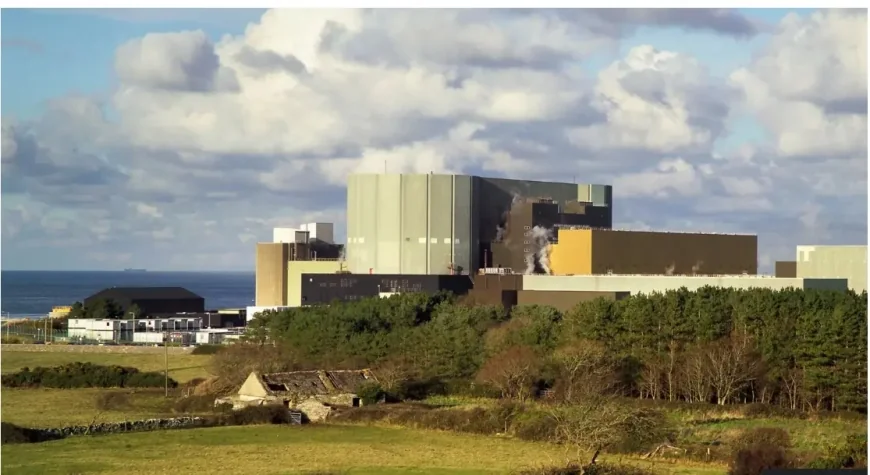The plant, located in Wylfa on the northern coast of the Welsh island, will house Britain's first three small modular reactors (SMRs), although the site could potentially house up to eight reactors.
Work is scheduled to begin next year with a target of generating electricity by the mid-2030s.
Prime Minister Sir Keir Starmer said Britain was once a world leader in nuclear energy, but "years of neglect and inertia have left places like Anglesey behind. Today, that has changed."
The project, which could power around three million homes, will be built by publicly owned Great British Energy-Nuclear and has received a £2.5 billion investment from the UK government.
Visiting a higher education college in North Wales on Thursday, Sir Keir said the development would bring jobs for "decades to come" and that work would begin "almost immediately."
Wales First Minister Eluned Morgan said she had "been pushing the case for Wylfa's incredible benefits at every opportunity."
SMRs operate similarly to large reactors, using a nuclear reaction to generate heat that produces electricity – but are much smaller, with only about a third of the output capacity.
Secretary of State for Energy and Climate Change Ed Miliband described the announcement as "exciting" and said Britain was in the race for new reactors.
Miliband said he hoped to "work closely with local colleges to ensure that local skills providers and skills training opportunities are available, so that local people can access these facilities and create jobs."
Simon Bowen, Chairman of Great British Energy-Nuclear, described it as "a historic moment for the UK."
Llynos Medi, MP for Ynys Môn, the Welsh name for Anglesey, said it was a "game-changer" for the region, "but only if local people see real and lasting benefits."
Shadow Secretary of State for Wales, MP Mims Davies, said it would bring much-needed jobs and investment, but "the current plan will only generate a fraction of the electricity generated by a gigawatt-powered plant."
Wales Green Party leader Anthony Slaughter said the project was "an expensive diversion from the clean, fast, and affordable renewable energy already available to us."
He added that "a rapid, ambitious rollout of solar, wind, and wave energy that will create jobs and cut energy bills" was essential.
The Federation of Small Businesses (FSB) Wales said the plant would bring a "once-in-a-generation" boost to jobs, supply chains, and regional infrastructure.
Great British Energy-Nuclear has also been tasked with identifying potential sites across the UK for another large-scale nuclear power plant, similar to those being built at Hinkley Point in Somerset and Sizewell in Suffolk, which could generate the equivalent of six million homes.
Officials said the company will submit its report by the autumn of 2026.
It is unclear whether the SMR plans, which are smaller and easier to build, exclude Wylfa, as the previous UK Conservative government declared it the preferred location in 2024.
'The nuclear equivalent of an Ikea chair'
Professor Simon Middleberg, director of the Nuclear Futures Institute at Bangor University, said the SMRs would be "built modularly in factories and shipped to site and assembled like an Ikea chair".
He cautioned that "some further hurdles remain" – from obtaining regulatory approvals, building the factories needed to construct the SMRs, and training the staff to operate them.
Opponents of the project point to the fact that a long-term storage facility for Britain's nuclear waste has not yet been agreed upon and say that investment in renewable energy schemes – wind, wave, and tidal – is what Anglesey needs.
Dylan Morgan of the People Against Wylfa-B campaign group said the proposed SMRs are "an unnecessarily large development of an unproven technology."
The government sees them as a safe, reliable, affordable, and low-carbon energy system and is confident that with investment, SMRs will create thousands of jobs and boost manufacturing.
Wylfa beat off competition from a plant in Oldbury, Gloucestershire, whose reactors are designed by Rolls-Royce and are subject to final contracting, which is expected later this year.
The British government said the plant would help provide energy independence.
The decision to opt for small modular reactors at Wylfa was criticized by US Ambassador Warren Stephens, who said he was "extremely disappointed."
He urged ministers to commit to a large-scale plant, for which US company Westinghouse had reportedly submitted plans for a new gigawatt station at the site.
Downing Street said the decision to build the power station in Wales "does not preclude any US manufacturer working on a future project."

 Like
0
Like
0
 Dislike
0
Dislike
0
 Love
0
Love
0
 Funny
0
Funny
0
 Angry
0
Angry
0
 Sad
0
Sad
0
 Wow
0
Wow
0











































